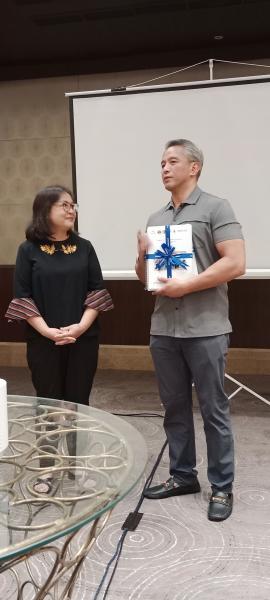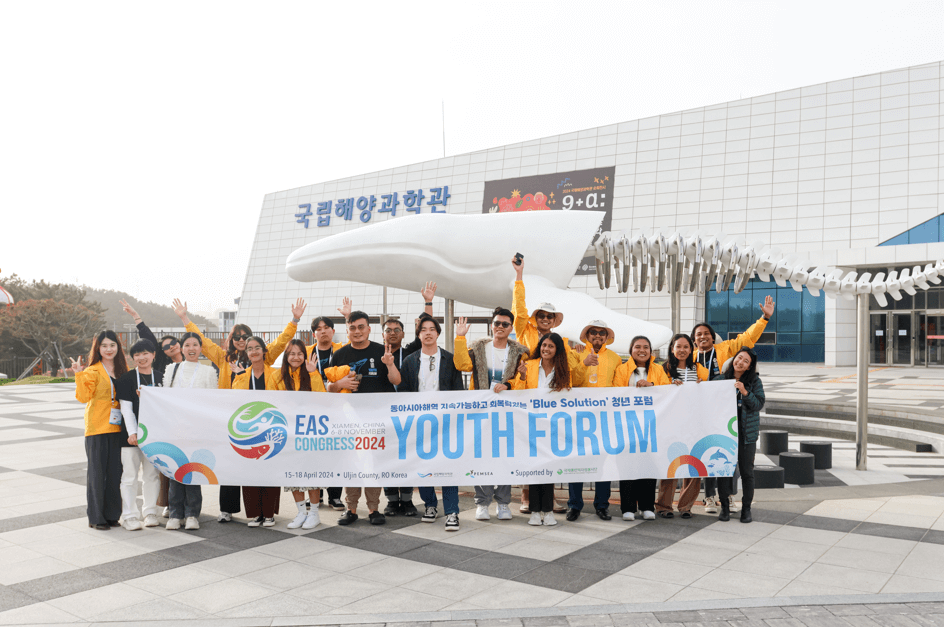Partnerships in Cavite Province: Reports from PEMSEA Plastic Waste Management project turned over to Governor Remulla
Friday, 24 March 2023

Cavite is a highly urbanized city with a population of 4,344,829. This large population generates an estimated 1,583.41 tons of waste per day. (See the Cavite Government population social profile and the Cavite Ten-Year Solid Waste Management Plan (2019-2028).) This has prompted the government to treat solid waste management as a priority concern and ramp up its efforts in partnership with various stakeholders, including government agencies, non-governmental organizations, and academic institutions.
During the first quarterly meeting of the Cavite Provincial Solid Waste Management Board (PSWMB), PEMSEA's Executive Director, Ms. Aimee Gonzales, turned over technical studies and knowledge products produced as part of two solid and plastic waste-related projects recently implemented in the province. The PSWMB, chaired by Governor Juanito Victor Remulla and comprised of the mayors of the 16 municipalities and 7 component cities of the province of Cavite, as well as representatives from relevant national government agencies, non-governmental organizations, academic institutions, and the private sector, held the meeting on 15 March 2023, at The Bayleaf Hotel in Dasmariñas City, Cavite.
In close collaboration with the Cavite Provincial Government Environment and Natural Resources Office (PGENRO) and local academic institutions such as Cavite State University and De La Salle University Dasmariñas, the Caritas Diocese of Imus Foundation, a local NGO, PEMSEA has implemented the ASEAN- Norway Cooperation Project on Local Capacity Building for Reducing Plastic Pollution in the ASEAN Region (ASEANO Project) and the Coca Cola Foundation Philippines, Inc. funded project on Ecological Solid Waste Management in Cavite Province (Coke Project). Both projects have produced technical reports, along with toolkit and communication materials on solid/plastic waste management.
Governor Remulla received a set of reports that covered technical studies in the Imus River watershed. These reports included primers and full reports on various topics such as the mapping and characterization of plastic litter, assessment of knowledge, attitude, and practices concerning plastic waste, social implications of plastic pollution mitigation initiatives, plastic use and management in the food service industry, and the LGU Marine Litter Toolkit produced under the ASEANO Project. Reports developed under the Coke Project included the waste analysis and characterization study of five local government units (Amadeo, GMA, Noveleta, Tagaytay City, and Ternate), community needs assessment on solid waste management in five barangays (Banaybanay, Amadeo; B. Pulido, GMA; San Rafael 3, Noveleta; San Jose, Tagaytay; and Bucana, Ternate), and documentation of lessons learned, benefits and impacts of project implementation, and good practices on solid waste management.
Governor Remulla emphasized that “everyone is part of the waste problem as we all generate wastes everyday thus, we should all be part of the solution”, cementing the need for continuing partnership and commitment in addressing solid/plastic wastes/marine pollution.
ASEANO Project
The ASEAN-Norwegian cooperation project on local capacity building for reducing plastic pollution in the ASEAN region (ASEANO Project) is a multilateral project implemented in the Philippines by PEMSEA. International partners include the Norwegian Institute for Water Research (NIVA), the Center for Southeast Asian Studies, and ASEAN. The project is financed by the Norwegian Development Assistance Program Against Marine Litter and Microplastics, where the main impact is to prevent and substantially reduce the scope of marine litter from sources in developing countries. The ASEANO project works to strengthen knowledge, capacity, and awareness to tackle plastic pollution from key sources in the ASEAN region by developing a strong network and close interactions with industries and businesses, governmental bodies and other stakeholders, other projects as well as NGOs.
Coke Project
Funded by Coca-Cola Foundation Philippines Inc., the Ecological Solid Waste Management Project (ESWMP) is being implemented in partnership with Caritas Diocese of Imus Foundation and in close collaboration with Cavite PGENRO since January 2020 in five communities, i.e., Banaybanay, Amadeo; B. Pulido, GMA; San Rafael 3, Noveleta; San Jose, Tagaytay; and Bucana, Ternate to support the diversion rate target of solid wastes in the Province of Cavite through capacity building, awareness raising, community engagement and empowerment, livelihood development and refining data analytics.



